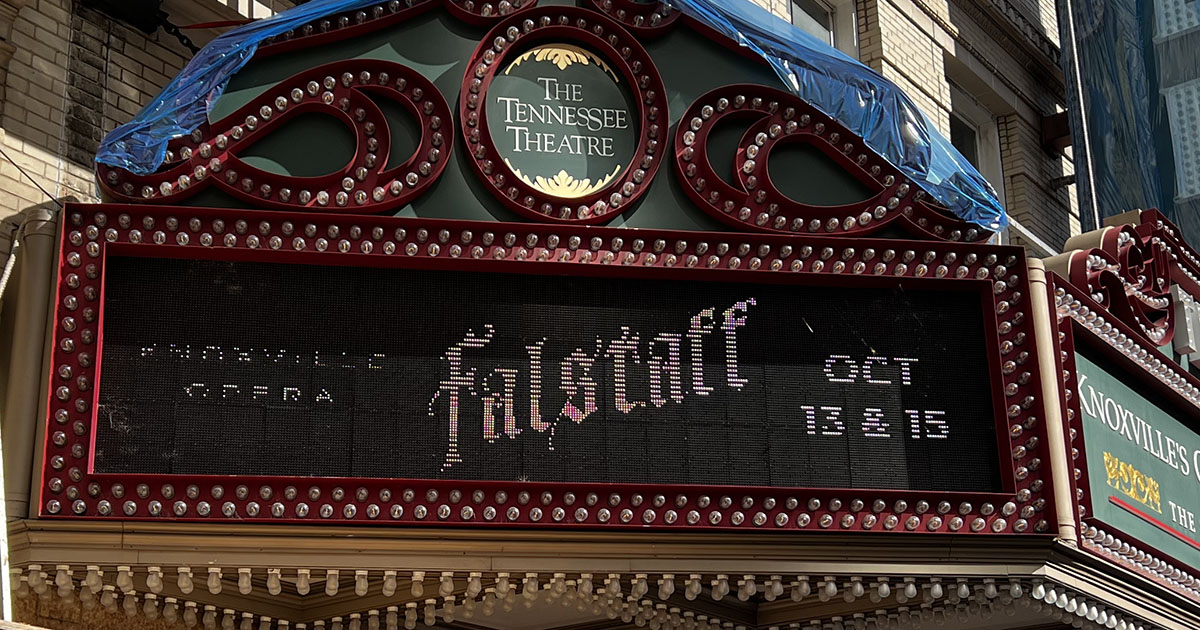Knoxville Opera’s opening production of the 2023-24 season will be the lyric comic opera, Falstaff, Giuseppe Verdi’s final operatic work. Based on Shakespeare’s play, The Merry Wives of Windsor, and scene bits from Henry IV, Part 1 and Part 2, the opera features the colorful and delightfully flawed character of Sir John Falstaff. There are two performances scheduled at the Tennessee Theatre—Friday evening, October 13, at 7:30 PM, and Sunday afternoon, October 15, at 2:30 PM. Tickets and Information.
History
After the premiere of Aida in 1871, the then 58-year old Giuseppe Verdi, whose career included over 20 major and minor masterpieces like Rigoletto, La Traviata, and Il trovatore, made good on his often-expressed desire to retire from composing opera. Fortunately for music history, a decade later in the 1880s, his interest in participation in the opera world had returned. Despite a generational gap of some 30 years and a history of political differences, Verdi reconciled and partnered with the skilled librettist, and composer in his own right, Arrigo Boito. Their first collaboration was Otello, based on Shakespeare’s Othello.
With Verdi having expressed an interest in composing for a comic libretto, and Boito secretly having ideas along those lines, the librettist constructed a work based on Shakespeare’s The Merry Wives of Windsor with a much more detailed character created for Falstaff. The pair agreed on the need to trim down the plot and remove some unnecessary characters. Although Verdi’s age was haunting him with doubts of being able to finish the project, he persisted getting encouragement from a number of sources. As word of the new Verdi opera hit the grapevine, intense public interest grew. By the time of its premiere in February of 1893 at La Scala, audience intrigue brought royalty and VIPs from all over Europe. The initial run of 22 performances was a huge success and was supplemented by additional performances in Italy, Vienna, and Berlin.
Although Falstaff was subsequently compared unfavorably by audiences and critics to Verdi’s most famous, more tuneful works, the work was championed by some key music world figures such as Arturo Toscanini, joining others such as Herbert von Karajan and Leonard Bernstein. Their belief in the work and its importance has kept it firmly ensconced in the regular repertoire of opera houses around the world.
The Music of Falstaff
As Verdi reentered the world of new opera works with Otello, and especially with Falstaff, the European operatic battle had become one of Verdian forces versus Wagnerian stylistic models. Needless to say, Verdi’s rhetoric made clear his lifelong approach to opera. “…Opera is opera. Symphonies are symphonies, and I don’t think that in an opera it is fine to have a symphonic element, merely for the pleasure of making the orchestra dance.”
Despite statements like these on what Verdi saw as the “dangers of harmonic and orchestral complexity,” it is inarguable that he was affected by what he considered modernism. Unlike previous work, Falstaff is through-composed—gone are the notably distinct arias and choruses, supplanted by melodic themes, textures, and symphonic rhythms. And, there is no overture.
Creative Staff and Cast of Knoxville Opera’s Falstaff
Knoxville Opera’s production of Verdi’s Falstaff is directed by Dean Anthony with Maestro Jorge Parodi in the pit conducting the Knoxville Symphony Orchestra. Baritone Steven Condy is making his KO debut in the role of the aging, down-on-his-luck knight, Sir John Falstaff. Giving him his comeuppance for attempting to steal their husbands’ fortunes are mezzo-soprano Eliza Bonet as Meg Page and Tori Patricia Franklin as Alice Ford. Renee Tatum, a recent addition to the UT College of Music voice faculty, will sing the role of Dame Quickly.
Rebekah Howell and Derrek Stark are the young couple Nannetta and Fenton; Kevin Godínez will sing the role of Ford; John Overholt sings Dr. Caius; and James Robinson and Gregory Sliskovich are Falstaff’s lackeys, Pistola and Bardolfo, respectively.








